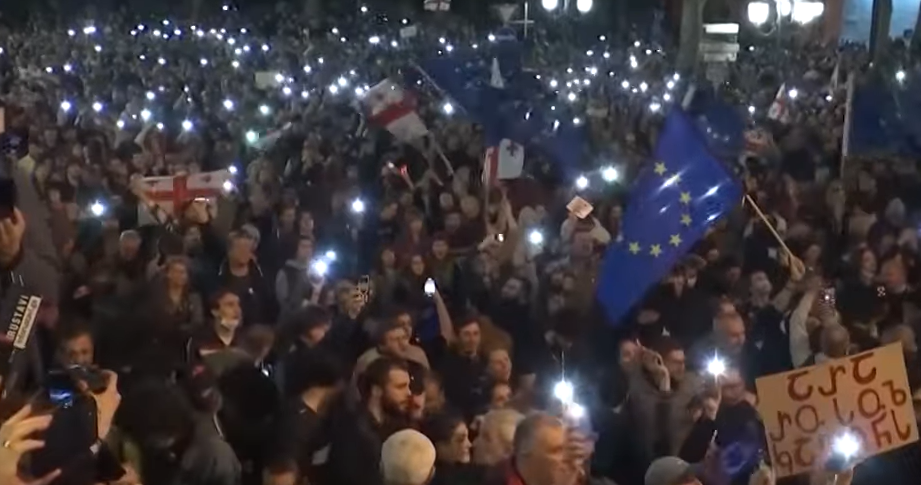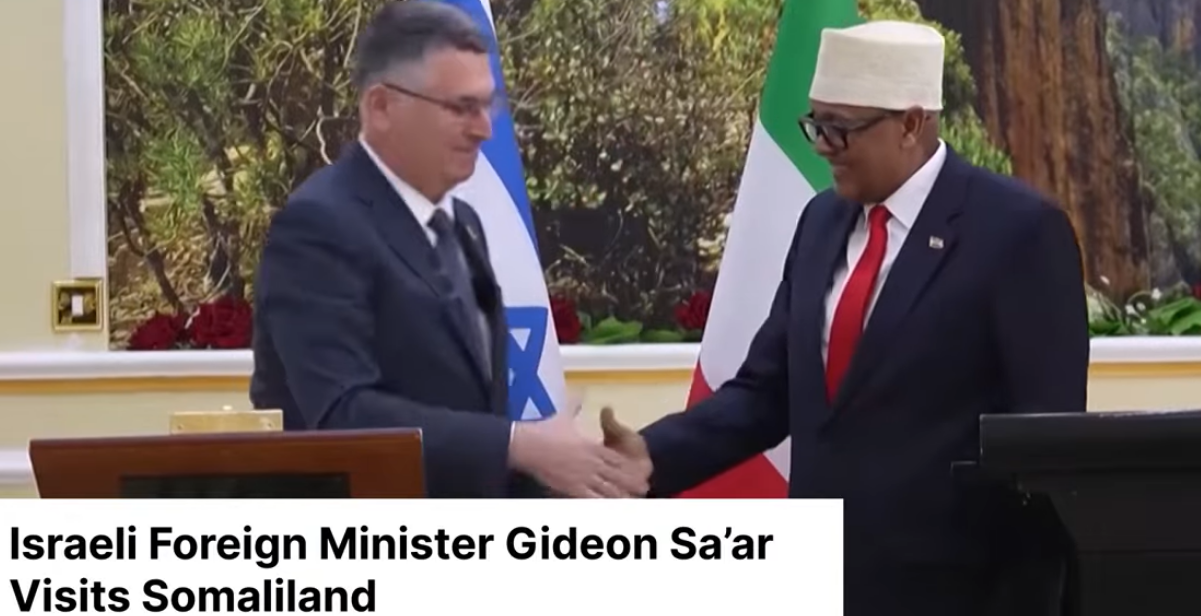By Martins Agbonlahor
Georgia is currently on the brink of a revolution over a proposed bill, a seemingly indecipherable draft legislation that presents itself like the onion: the more you peel off the outer layers, the more you are confronted with the shiny, tear-inducing inner layer. No wonder the people wants it avoided like the plague.
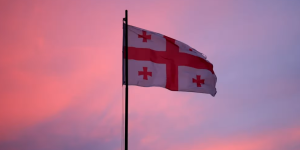
Georgia, I say, but this isn’t the famed Georgia we have in Atlanta, USA, but its namesake, nestled in the Greater Caucasus Mountains in the Eastern end of the Black Sea.
This small country of 3.7million inhabitants is not new to mass protests though. In fact, I got acquainted with her in the summer of 2003, primarily because of that: a parliamentary election allegedly rigged by the Moscow-sponsored, oligarchic government of President Edward Shevardnadze, threw the entire country into a revolt culminating in what became known as the “Rose Revolution,” where the mass of the people, armed with mere rose flowers, engaged in peaceful protests, sit-ins, strikes, and other forms of civil disobediences.
Led by a 36-year-old Mikhail Saakashvili – an energetic young man whose head was brimful of ideas – the goal of the protests was the immediate resignation of the president, the adoption of Western-style liberal democracy, introduction of anti-corruption reforms, and European integration amongst others. The peaceful protesters, fortified by the country’s numerous NGOs, persisted in their demands, and within a space of three weeks; activities had been brought to a standstill in Tbilisi, the country’s industrial capital. And then, the president’s regime suddenly collapsed like a pack of cards, as his popularity plummeted below rock bottom. Shamefaced, he eventually resigned, paving the way for a fresh election, where Mr. Saakashvili won a landslide victory, thus, becoming the youngest president in Europe.
That was twenty-one years ago. But today, the embattled masses of Georgia are out again, this time, for a different reason, and Tbilisi, a hive of activity.
It all started when the country’s parliament, The Sarkartvelos P’arlament’i, passed a law coded the “Foreign Agents” Bill, two weeks ago. The legislation in essence, required Non-Government Organizations (NGOs) and media houses to register as bodies “pursuing the interests of a foreign power” if more than 20% of their funding comes from outside the country, and that they will be heavily fined or proscribed if they refuse to comply.

This was the nitty-gritty of the bill, but hardly had the ink in which it was written dried out when the Georgian masses converged in Tbilisi to protest against it.
The issue has actually polarized the country’s politicians, and Georgians are set on a collision course with some of their Moscow-leaning politicians. While the country’s Prime Minster, Irakli Kobakhidze, supports the bill, saying it will “wholly preserve Georgia’s autonomy,” its President, Mrs Salome Zourabichvili objects to it, arguing it will be “an affront to democracy and pull the country closer to Russia.”
Only a few days ago, one of the politicians against the new law threw decorum to the wind and slapped another, who, himself, replied in kind – and in no time – a free-for-all-fight had ensued, turning the country’s law-making chamber into a theatre where kung fu, judo, tai chi, and other forms of martial arts are exhibited. Who will referee when the referee is floored, you might ask.
Georgia’s politicians supporting the new legislation believe it will help in stemming the tide of the huge donations coming into the coffers of the country’s powerful NGOs and curtail not only their dependence on foreign countries, but covertly whittle down the huge influence they wield, and not least their sterling bargaining powers, judging by the role they played during the aforementioned Rose Revolution.
They, these politicians, hinge their argument on the hoary chestnut of “he who pays the piper dictates the tune.” But the Georgian masses remain unconvinced. They believe these politicians – most of them under the apron strings of Russia’s President Putin – have a secret agenda to tie them perpetually to Russia and derail the country’s proposed admission into the European Union.
As a lawyer, myself, I must query the wording of the legislation itself, which I find suspect. In fact, it opens itself to scrutiny, left, right and centre. Which charitable organization, proprietor or proprietress, as the case may be, will don the toga of “pursuing the interests of a foreign power,” when the proponents of the legislation are covertly and sometimes, overtly against these foreign powers? It is commonsensical to allude that this same government officials who favour this law, would arraign these individuals in court tomorrow and declare them personae non gratae for “spying for a foreign country?”
This is the problem with this contentious legislation, which, for all intents and purposes, is a trap to ensnare those it is enacted against: The various NGOs and media houses, which rely staunchly on foreign sponsors to survive. The new legislation places them between the devil and the deep blue sea, so much so that if they acquiesce to the legislation, they will eventually fizzle out. Shunning it will also produce the same result. This, therefore, is all the more reason the legislation should be rescinded forthwith.
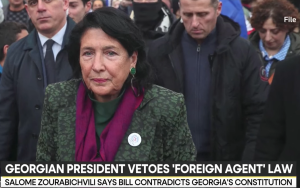
The governing party and some of its politicians have tried to convince those opposing the legislation not to be bothered or swayed by the nomenclature. The new legislation, they posit, “means no harm,” but their sugar-coated approach has been discerned as less moonshot, more moonshine, much to their chagrin.
Incidentally, President Putin of Russia currently has a variation of this same legislation, which has reportedly been (mis)applied in railroading government’s critics into jails and whipping those with a contrarian disposition into line. In this vein, the opposing politicians in Georgia and the poor masses fear the legislation will be used for the same purpose, and have thus, labelled it “The Russia Law.”
Taking this further, it beggars belief that President Putin, himself, is still living in a fool’s paradise. And comfortably so. He wants to be seen as the Lord of the manor or worse, an emperor, dictating to his neighbouring countries from the Kremlin as if the old USSR was still in existence. He should know that times have changed, and that USSR’s former ‘colonized’ countries of Ukraine, Georgia, Belarus, Latvia, Moldova, and others, are yearning for democracy, rule of law, civil liberties, freedom of speech, and other values that were flagrantly denied them when they were under the jackboots of USSR commanders. They also want transparency and the minimization of bureaucracy. This, I think, was what Perestroika and Glasnost was all about. But alas, Putin and his team of ‘Oil-igarchs’ (excuse my coinage), will not listen.
While I am of the opinion that proponents of this legislation do not mean well, there’s every reason to be wary of their antics, as most politicians are known for their skulduggery. Many do also speak out of both sides of their mouth, especially when corrupted by the arrogance of power. The West African country of Nigeria is a case in point.
In the mid-eighties, the country’s self-styled “president,” General Ibrahim Babangida, once preyed on the gullible Nigerian public by proposing a so-called “political debate” on the country’s application of becoming a member of the Organisation of Islamic Countries (OIC), much to the chagrin of those of us, Christians and agnostics. Nigeria had been a secular state from time immemorial, and while the generality of the country’s citizens were poor, ragged, and surviving on less than a dollar a day, we wondered about the General’s antics.
The two-week “political debate,” which in reality, was a convenient conduit for siphoning the country’s petrodollars, cost us millions of dollars, and before one could say ‘Hey!’ Nigeria had been dragged into the OIC, cutting her out as an Islamic State, no thanks to General Babangida’s web of tangled lies. This, of course, opened the floodgates of unrests and most of us, the protesters, were tear-gassed and baton-whipped by the General’s band of blood-thirsty marauders, and thrown into congested jails.
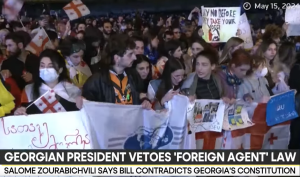
Babangida’s skulduggery dealt a heavy blow to Nigeria’s erstwhile secularism, so much so that what we are now familiar with is religious feud, Holy War, Fulani herdsmen, Boko Haram, and other preposterous slogans associated with medieval times.
The USA has reportedly condemned the new Georgian bill while Russia and her politicians are in tacit approval. These two greedy nations do not mean well, as they are solely after their economic interest and the juice they avariciously wish to milk out of Georgia. Put succinctly, they are the “two cheeks of the same backside,” to quote the maverick British politician, George Galloway.
Georgia, I dare say, should be left to shape its own destiny and not condemned to being a pawn in the game of power politics between the US and Russia.
Just last week, the Georgian riot police – those bloody hounds – were set loose on the peaceful demonstrators, with batons, teargas, and stun grenade, freely used. Several demonstrators had life threatening injuries and others, brutalised.
This should not be. We want peace in Georgia. The relatively few parliamentarians who are in support of the new legislation must mend fences with the protesters with a view to finding a way out of this logjam. If this ripple is not well managed, it could turn into a tidal wave of violence and this will not augur well for Georgia and her people.
A word is enough for the wise.
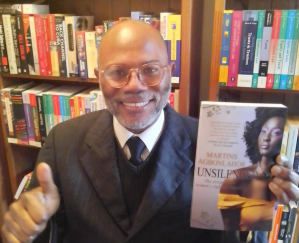
Martins Agbonlahor is a trained lawyer, journalist and author. He resides in Greater Manchester, The United Kingdom.
